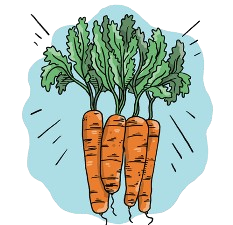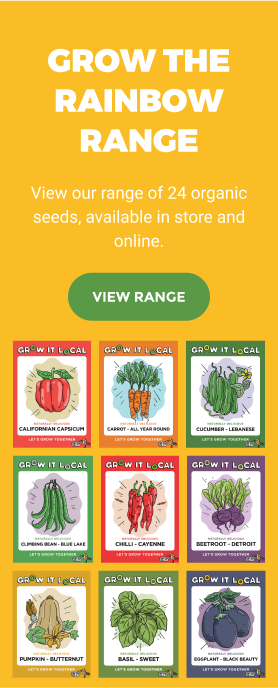Learn to grow microgreens at home, join Grow It Local +
How to grow
Join Our Community
Learn to grow and cook healthy, delicious, organic food at home by joining our seasonal grow-alongs.
Join Our Community
Learn to grow and cook healthy, delicious, organic food at home by joining our seasonal grow-alongs.
Growing Tips and Tricks
Location:
Carrots like to grow in full sun and well-drained soil. So choose a spot that gets at least 6 hours of sunlight a day
To prepare your beds for planting carrots, give your beds a good fork to loosen up any clumps that will cause your carrots to grow in funny shapes and split. Feed the soil by working in some compost, worm castings or well rotted manure.
Carrots take around 10 days to germinate, so make sure the soil stays moist until they emerge.
Watering:
Carrots need to be watered regularly, but be careful not to overwater. The soil should be moist, but not soggy.
Problems:
Carrots are relatively pest free, but look out for carrot flies. Avoid infestations by keeping plants healthy and properly watered.
Bolting:
Carrots can bolt, which means they have a tendency to run to seed before producing their roots, it usually caused when the plant is shocked with dramatic change. To avoid, so directly into the garden, don’t transplant and try to protect from any dramatic changes in weather.
Harvest:
Carrots are ready to harvest when they are about 5cm in diameter. To harvest, simply dig them up with a garden fork. You can eat carrots raw, cooked, or pickled.
Background
How far back do carrots go as a part of the human diet?
Oh, not that far, just further than agriculture itself!!! People have been harvesting and consuming nutrient packed tubers like carrots and their ancestors for 1000s of years!!
Carrot historians believe that the root originated in Central Asia and has been cultivated for as long as 5000 years!
Purple and red carrots can still be found growing wild in present day Afghanistan!
The humble root spread it’s wings over the centuries, spreading from Iran, Spain and Northern Africa and then northward into Europe. Originally it wasn’t grown as a foodstuff, but for it’s seeds which were thought to have medicinal properties.
It was in Holland in the 16th century that the carrot as we know it today finally emerged, thanks to the efforts of carrot loving dutch plant breeders.
A few carrots even showed up in the priceless paintings of the dutch masters
Do you remember how bugs bunny would always be chewing on a carrot? Well turns out that’s a bit of a myth and the RSPCA advises against giving rabbits carrots!!
Health Benefits
Homegrown, organic carrots are good for you!
Carrots are an excellent source of vitamins (A and C) and minerals (potassium). Including carrots in your diet can help promote healthy vision, immune function and protect against chronic disease.
Patch to plate
Culinary Options
Carrots fresh from the garden are one of life’s great pleasure’s. They are 100x sweeter than the ones you buy in the shops! If you do get your carrots out of the garden and into the kitchen, here’s a couple of bits of carotty culinary inspo for you!
- Roasted and served with nuts, herbs and some fresh cheese as a delicious salad
- Pickled, to add some crunch and tangy when served in salads or alongside cured meats and cheeses
- Cut into super thin ribbons using a peeler and serves with dried fruit and some fresh herbs as a delicious salad
- CARROT CAKE!




